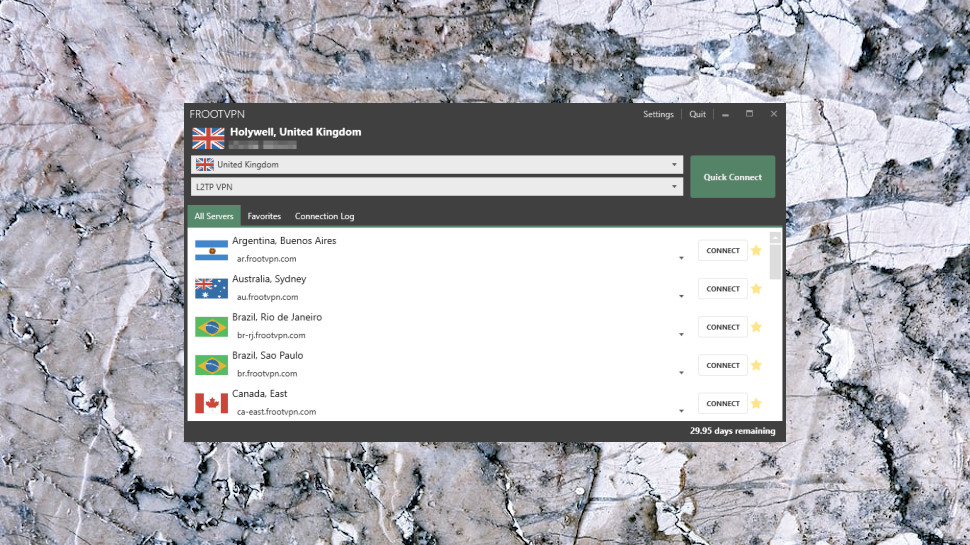TechRadar Verdict
FrootVPN boasts solid European speeds and a bargain monthly plan, but desperately needs its own mobile apps.
Pros
- +
Decent speeds
- +
Unblocks US Netflix
- +
Cheap monthly plan
- +
Well-designed web control panel
Cons
- -
No mobile or Mac apps
- -
Didn't unblock iPlayer, Amazon, Disney+
- -
Windows kill switch issues
- -
Lack of transparency about the company
Why you can trust TechRadar
FrootVPN is a Swedish VPN provider which seems to offer a reasonable service for a very fair price.
The network is a decent size, for instance, with 43 P2P-friendly locations including 7 in the US, many others in Europe and Asia, and less-common countries including Brazil, China, Costa Rica and Mexico (Russia was on the list for our last review, but seems to have disappeared this time.) P2P is supported everywhere.
FrootVPN only offers a Windows client - that's right, nothing for Mac, iOS or Android - but there are instructions for setting them up manually, along with Linux, Chromebooks, routers and more, and you're able to connect up to five devices at once.
- Want to try FrootVPN? Check out the website here
The FrootVPN website says the service allows you to 'freely access websites like Netflix, Pandora Radio, Spotify, Hulu, and many more.' We never take these claims as guarantees - unblocking sites like Netflix is difficult, and even the best VPNs might fail occasionally - but it's still good to see providers make this kind of public commitment.
Monthly pricing is exceptionally low at just $4.99. Many providers charge at least twice that.
Pay quarterly and the cost drops to $3.99, while the annual plan is an effective $2.99. There are cheaper deals around, but usually only if you sign up for two years or more.
FrootVPN scores for its support for a wide range of payment types, including card, PayPal, Perfect Money, Bitcoin and multiple other cryptocurrencies.
There's no trial, unfortunately, but you're protected by a 30-day money-back guarantee, at least in theory. The small print says the company only gives refunds "if the user had reasonable expectations on the service which Frootvpn.com was not able to fulfil", which suggests this is far from unconditional. You must have some kind of problem with the service, and convince FrootVPN that your issue is 'reasonable', before you'll get your money back.
We're not entirely happy with the refund policy, then, but we can also understand FrootVPN wanting to protect its margins from freeloaders who abuse the system. This isn't a company trying to rip anyone off, just look at the prices - spending just $4.99 to check out a service for a month really isn't a bad deal.
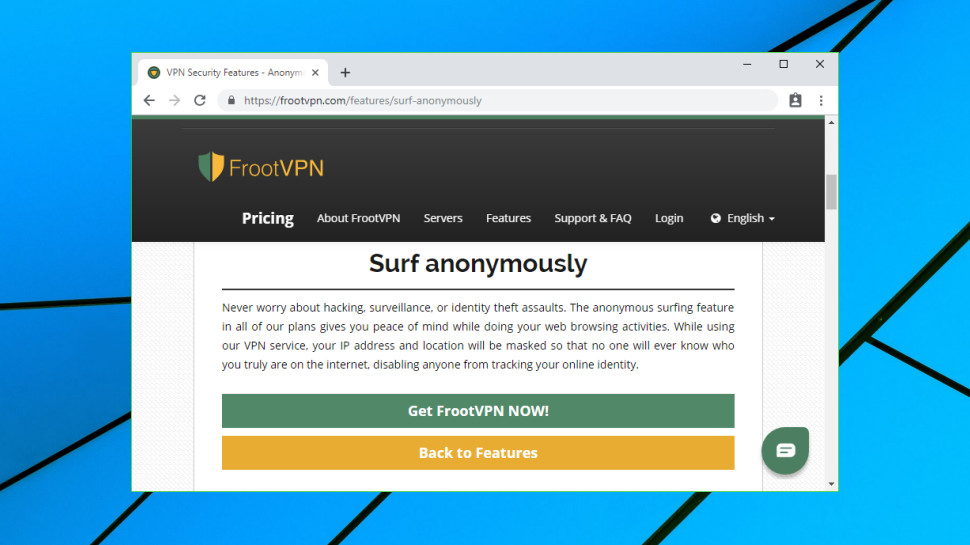
Privacy
The FrootVPN website states upfront that there's "no logging of your activity". Sounds promising, although we wouldn't expect them to say anything else.
A 'Legal' page lists all the details it doesn't log: 'Connection duration, Connection timestamp, IP addresses, DNS requests, Locations and servers user connected to.'
The only network-level information FrootVPN collects, it says, is the amount of data you've transferred and the current number of simultaneous connections (necessary to enforce its limit of 5.)
As FrootVPN hasn't reported any kind of public audit on its systems (unlike ExpressVPN, TunnelBear, NordVPN and others), there's no way for potential customers to know if it lives up to its promises, and potential customers must take what it says on trust.
Looking at who owns a VPN provider can sometimes offer clues. In this case, FrootVPN appears to be one of several VPN brands owned by Edelino Commerce, along with Anonine VPN, VPNTunnel, BoxPN and more. Sounds like Edelino might be some tech giant that automatically deserves extra trust, right?
Well, maybe not. When we visited the Edelino Commerce website, we found a single-page effort with minimal information, and so poorly set up that its Google Maps integration is broken, and the site doesn't even have a working https connection. Its certificate is for affiliate.vpnpartner.com, rather than edelinocommerce.com, which might reflect the main purpose of the company: to make money by encouraging others to market the VPNs.
We wondered if checking the Whois records for vpnpartner.com might tell us more about what was going on here, but no- it's been registered using a privacy service, and there's no way to see who is behind it.
While none of this is even close to evidence that Edelino is doing anything dubious, it's not exactly transparent, either. When big-name competitors are now having public security and privacy audits, it's no longer enough for the rest of the industry to just say 'we don't log anything, no, really' and hope users will believe them.
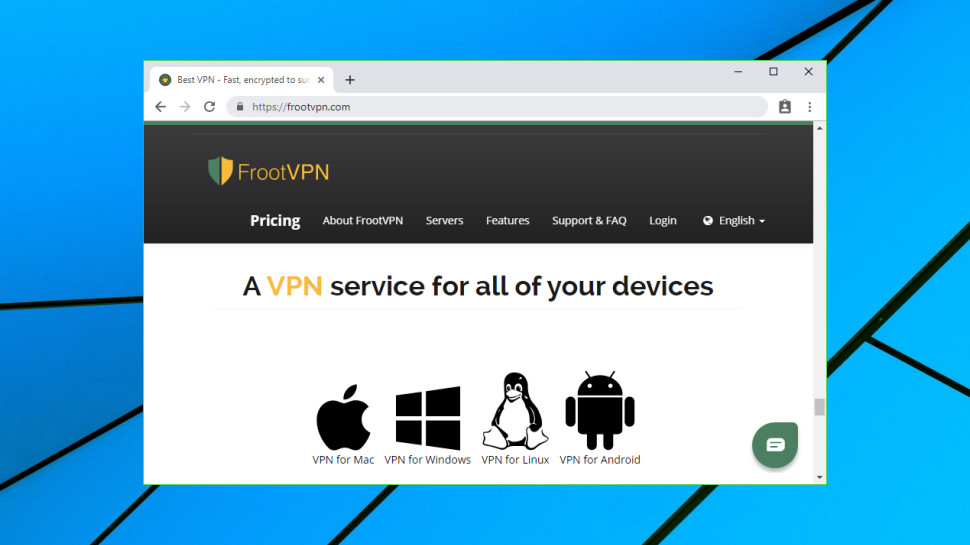
Client setup
Signing up with FrootVPN is simple and straightforward, with everything happening on the same page. Pick a plan, enter your email address and choose a payment method. You can even decide whether to enable a subscription (an automatic renewal) or just make a one-off payment, a welcome choice which you don't often see elsewhere.
FrootVPN's powerful web console looks more like a web hosting control panel than the usual VPN offering. A Home page displays account status and provides download and help links. 'Server Info' provides details and OpenVPN configuration files for FrootVPN's servers, and a 'Diagnostics' page runs ping and speed tests on your preferred locations (very handy for figuring out whether speed issues are a network problem, or at the server side.)
The console does a great job of organizing information and making it easier to use, and there are some unexpected extra features tucked away. Interesting in using the speedy WireGuard protocol, for instance? It's not available in the FrootVPN app or on most servers, but the console does offer configuration files for a handful of servers, mostly in Asia and Oceania. Set up a third-party WireGuard client and maybe you'll get better speeds.
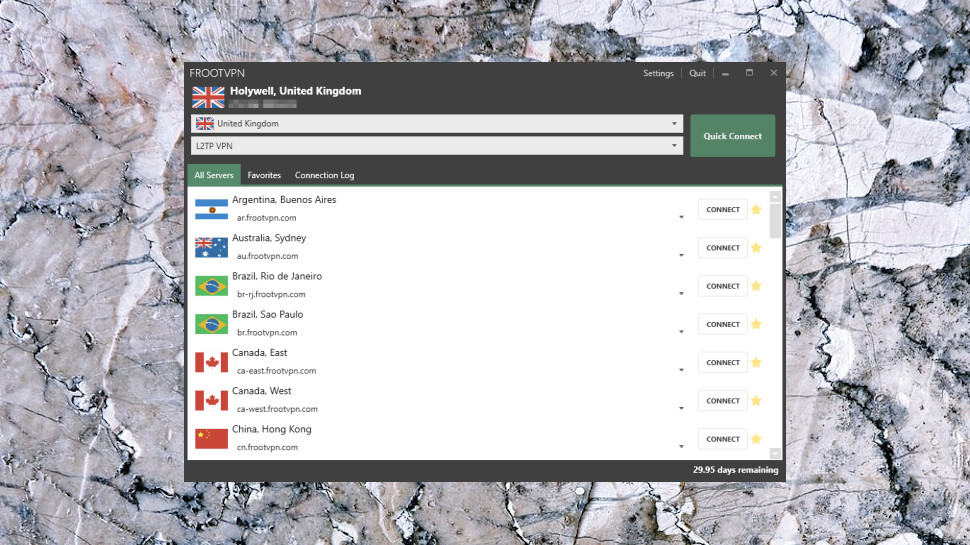
Apps
We installed the Windows client, and initially it looked promising. There's a list of servers, a favorites system for commonly used locations, a choice of protocols (OpenVPN TCP/ UDP, L2TP, PPTP), even a connection log to help with troubleshooting.
Unfortunately, the client didn't always work as we expected. Instead of the usual 'Automatic' option where the client chooses the fastest location, a much less useful 'Any country' feature just allocates a server randomly.
The FrootVPN client has only a few settings. Most of the options are very standard: you can start the client with Windows, auto-reconnect if the connection drops, and set the OpenVPN TCP and UDP ports, for instance.
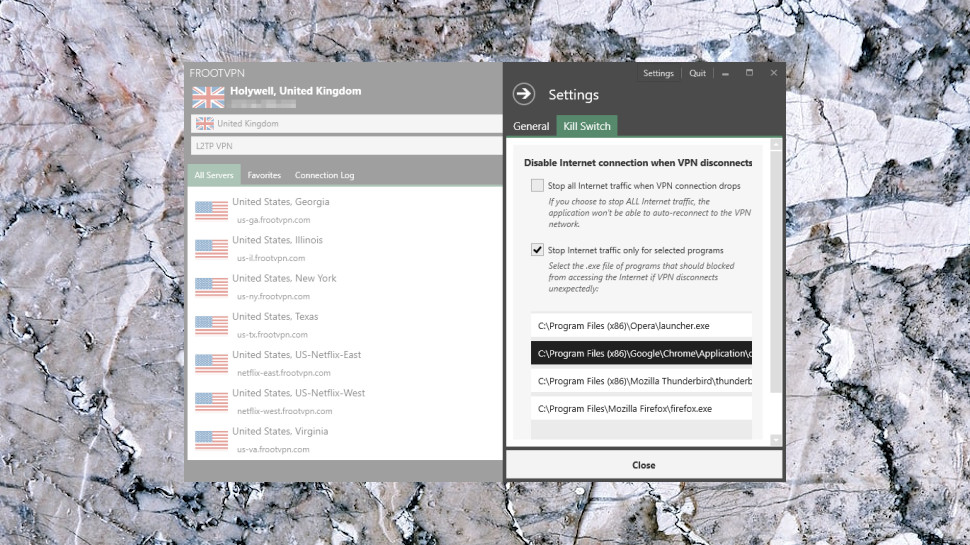
You do at least get a sort-of kill switch to avoid identity leaks if the VPN connection drops. This looks more versatile than usual, too, with the ability to block all internet traffic, or just traffic for specific applications. But there are problems.
The most fundamental is that the kill switch requires the Windows firewall to work. If you have the firewall turned off, maybe because you're using something else, the kill switch will tell you it's worked, but in reality won't do anything at all.
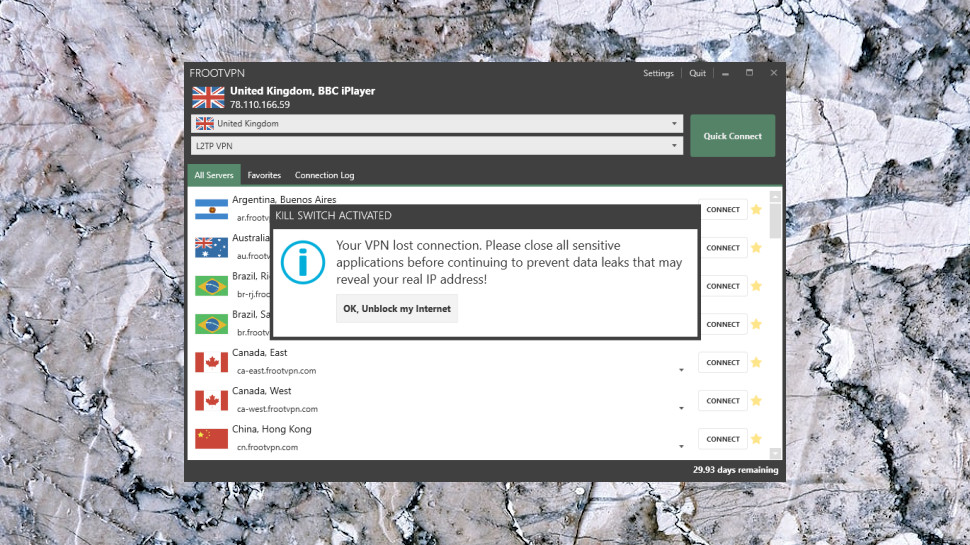
The second issue is that if you choose to block all internet access, the client even blocks itself, and so can't automatically restore the connection. Instead, you're warned the connection has dropped, must acknowledge this, and the client then unblocks the internet for you.
(Smarter apps set up a rule to ensure they can access the internet, even if everything else is blocked, allowing them to automatically reconnect.)
The third oddity? When the kill switch is off, you can switch from one server to another simply by clicking its Connect button. Enable the kill switch and you must manually close the current connection, before switching to another. Again, you'll figure that out quickly enough, but it's clumsy, and awkward, and not how we would expect the system to work.
FrootVPN's kill switch is just about as most basic and unsophisticated as you'll get, then, but there's good news, too: the core engine works as expected, and it really does protect your privacy. We forcibly closed both OpenVPN and L2TP connections, and in each case the client immediately blocked our internet access when the VPN dropped. The kill switch may not be as polished as we'd like, but it does its job, and that's better than we've seen with some clients.
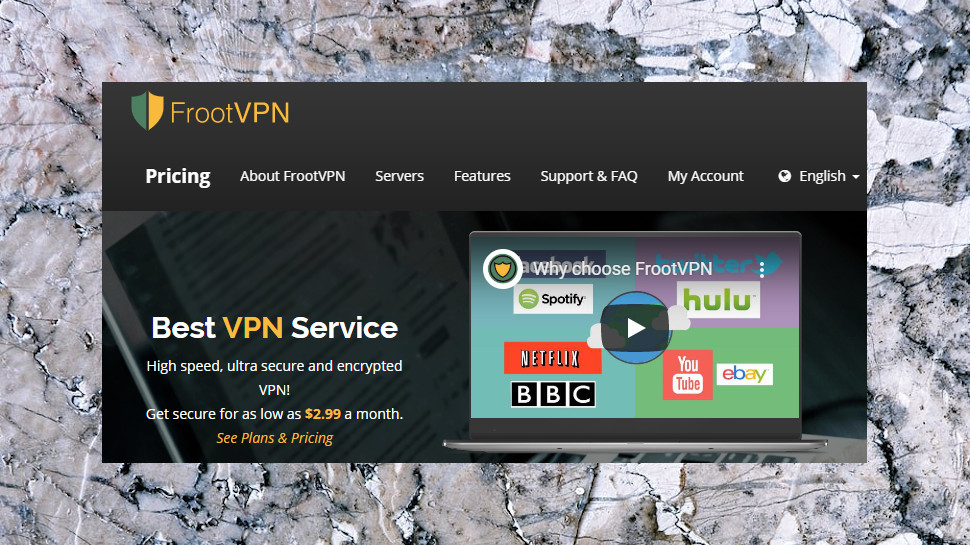
Performance
The FrootVPN website claims it can help you unblock web content, and the Windows client even has specialist Netflix and BBC iPlayer-related locations to make your life easier.
The service couldn’t unblock iPlayer for us, unfortunately. We tried the official iPlayer option and the two regular UK selections, but couldn't stream content. It also failed with Amazon Prime Video and Disney+.
There was better news with US Netflix. FrootVPN provides east and west coast specialist Netflix US servers, and they both allowed us to access and view US-only Netflix content.
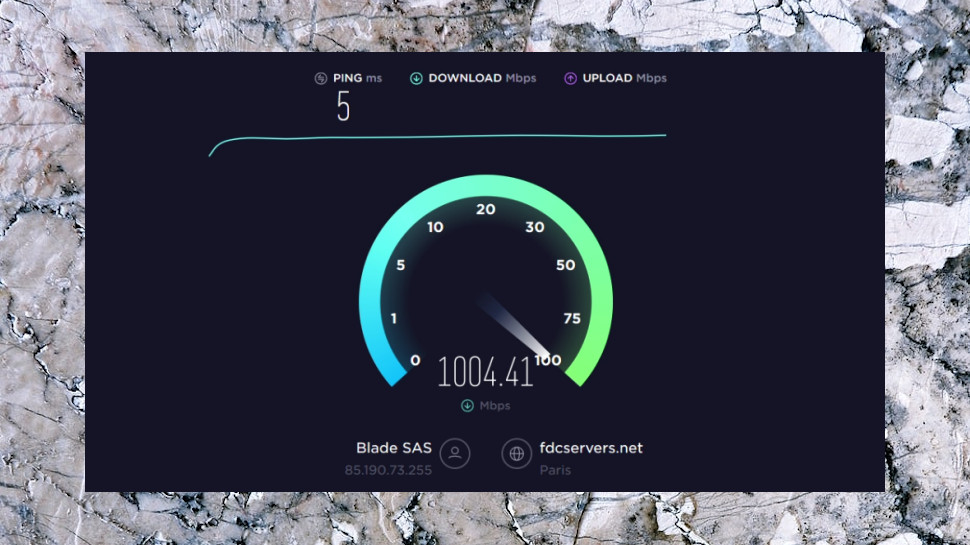
Performance testing started by running basic tests on a sample of FrootVPN locations. Most connected quickly and geolocation checks suggested they were in their advertised locations, but the Costa Rica server appeared unusable, and we were never able to connect. Normally we'd assume that was a temporary network issue, but we couldn't access it in our last review, either.
When we did get online, FrootVPN performed reasonably well. Our nearest UK location gave us an average of 66-68Mbps on our test 75Mbps line. Most European locations were similar at 50-60Mbs. We ran a second group of tests from a data center in Europe and averaged around 100Mbps, which isn't going to break any records, but it's sufficient for most devices, connections and tasks.
Final verdict
Decent performance and seriously cheap, but unblocking performance was below average, and the lack of mobile apps is a major annoyance. Might work for specific situations, like a short European trip where you need to unblock Netflix, but otherwise you'll get better service elsewhere.
- We've also highlighted the best VPN

Mike is a lead security reviewer at Future, where he stress-tests VPNs, antivirus and more to find out which services are sure to keep you safe, and which are best avoided. Mike began his career as a lead software developer in the engineering world, where his creations were used by big-name companies from Rolls Royce to British Nuclear Fuels and British Aerospace. The early PC viruses caught Mike's attention, and he developed an interest in analyzing malware, and learning the low-level technical details of how Windows and network security work under the hood.
